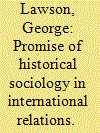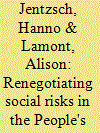|
|
|
Sort Order |
|
|
|
Items / Page
|
|
|
|
|
|
|
| Srl | Item |
| 1 |
ID:
075356


|
|
|
|
|
| Publication |
2006.
|
| Summary/Abstract |
This essay draws on historical sociology, in particular on historical institutionalism, to critique the micro-, macro-, and meso-level explanations of contemporary international relations theory. Focusing on institutional development, change, and disintegration, it proposes a conjectural, mid-range approach to capturing the processes of large-scale change that are occurring in the international realm. This essay seeks to broaden the field's scope by outlining the possibilities that historical sociology offers to international relations theory and practice.
|
|
|
|
|
|
|
|
|
|
|
|
|
|
|
|
| 2 |
ID:
171714


|
|
|
|
|
| Summary/Abstract |
There have been various attempts to capture the direction of welfare provision in Japan and the People's Republic of China (PRC) as a regionally coherent welfare regime, following on from attempts by the welfare regime literature to categorize nation-states by the characteristics of their welfare provision in the West. However, stark differences between the PRC and Japan as regional neighbours, and even within the regions of each country, pose a challenge to this kind of macro-level theorizing. This special issue seeks to supplement macro perspectives on welfare regimes by exploring a range of welfare policies across both states from an ethnographic, bottom-up perspective, which captures the dynamic nature of welfare and highlights the importance of understanding how local actors request, interpret, and implement risk management strategies. The management of social risks is shown not to have one clear direction determined by, for example, market logic: instead, this special issue highlights the ways in which the burden of risk shifts between family, market, state, and communities unevenly over time, reflecting underlying institutional norms which are always up for negotiation. In doing so, this special issue emphasizes the importance of local, contextualized understandings of welfare, and suggests that the comparative welfare regimes literature should seek the micro-institutional foundations of welfare provision as the basis for comparison.
|
|
|
|
|
|
|
|
|
|
|
|
|
|
|
|
|
|
|
|
|